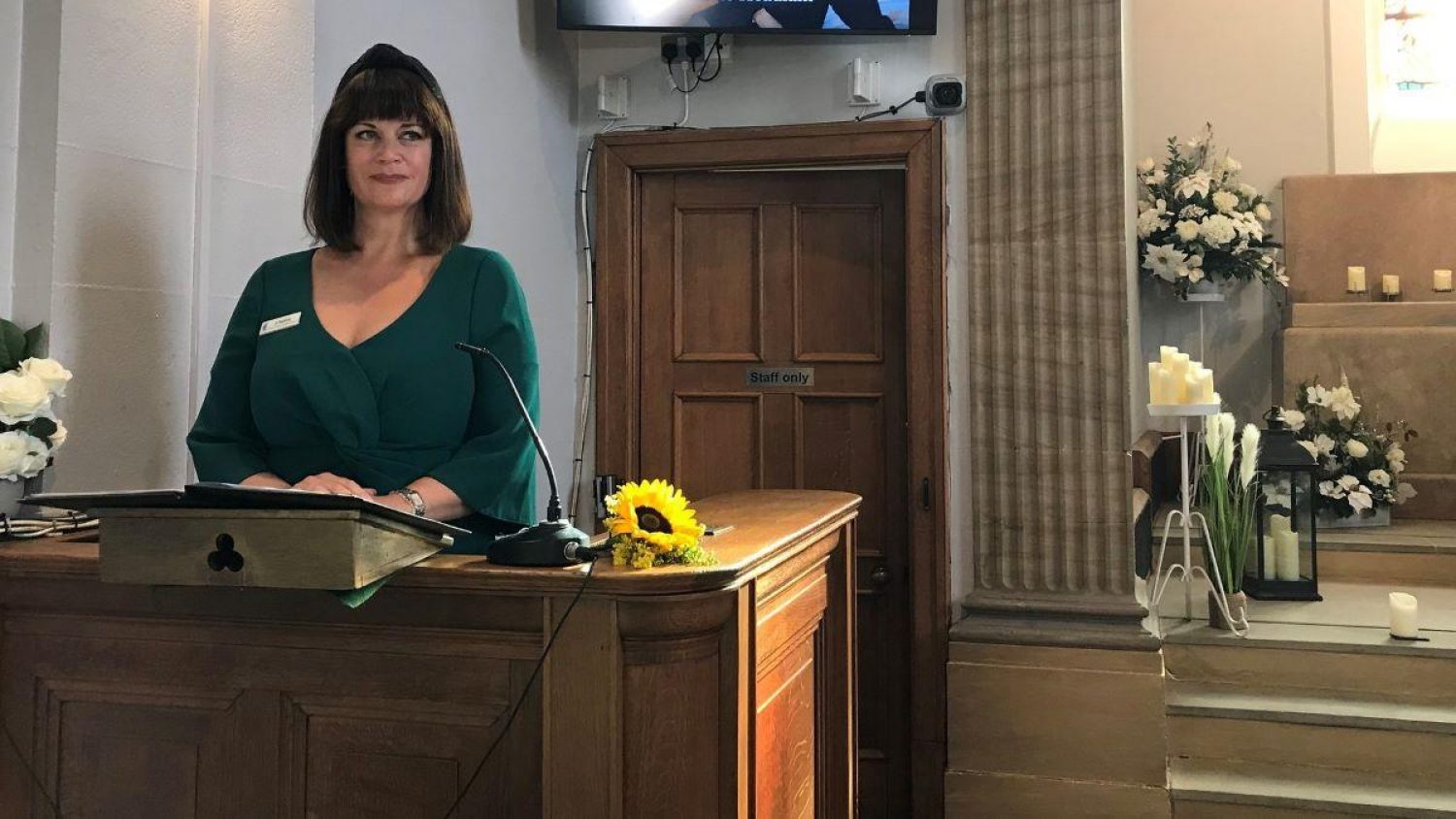Five minute read
A eulogy, or tribute, is an opportunity to share memories and stories about someone who has died, as part of the funeral ceremony. It can be an honour to deliver a eulogy, but it can also be a source of anxiety.
Here, Poppy’s team members and Bob Dennell, one of our celebrants, offer practical tips and address common worries about writing and delivering a eulogy.
‘I don’t know what to say!’
There’s nothing you have to include in a eulogy. You certainly don’t need to cover everything about that person’s life, in chronological order. That would be impossible, and would often be telling people what they already know!
Celebrant Bob Dennell describes a eulogy as “splashes of colour on a canvas of memories”. His advice is to pick out a few “cherries” — memories and anecdotes that will spark surprise or recognition in the people attending the funeral.
If you get stuck, think about your audience. What might they not know about the person? Which anecdotes would interest them? Which memories would best reflect the person’s character and personality? It’s okay if people laugh when sharing happy memories or funny quirks about the person who has died.
Be authentic. You can include things that might have been annoying or difficult about the person when they were alive, especially if it’s something that everyone listening will recognise.
You can sometimes feel the relief in the room when someone mentions how the person you are remembering loved an argument or was always late!
Keep it personal. We’ve heard beautiful eulogies which quote from letters or articles that the person who has died had written, or where someone shares a passage from a book they both loved, or even where friends or family have sung a song that means something special.
You can ask other family and friends for one-liners, short anecdotes or words or phrases that remind you of the person who has died, and compile these into a list.
You don’t need any special qualifications! Anyone of any age can deliver a eulogy, even if it’s just a few lines from a child.
‘How long is too long? I don’t want to bore people.’
Depending on what else is happening during the ceremony, between three and five minutes is usually about right. Your celebrant can advise you, and will be able to keep an eye on the time on the day.
It sounds obvious, but check how long your eulogy is in advance. Practise it on friends or family — or the bathroom mirror — and time yourself. Remember, you will need to speak more slowly than usual in front of an audience.
Some people find that they speed up when they are nervous, or that they get breathless, which makes it harder to get the words out.
Aim for a eulogy that is slightly shorter than the time allocated — this takes the pressure off and stops you feeling like you have to rush through it.
There are many free online calculators like this one that can help you work out how long your eulogy will take to deliver. A 450-word eulogy takes about three minutes.
‘What if I lose my place, or break down and can’t finish?’
First of all, it doesn’t matter if you break down, cry or need to pause halfway. People will understand. It is natural to feel sad and overwhelmed at a funeral. Don’t be afraid to show your own emotions.
Many people worry that they won’t be able to deliver their tribute because they cannot practise it without crying. However, in our experience, most people don’t face this problem on the day.
Write down what you intend to say and print it out in a large font, with gaps where you want to pause. This enables you to use your computer’s word count function to check how long your eulogy is while you are writing it.
Reading from a print-out is easier than reading from a phone screen. Don’t forget the page numbers!
Having a print-out means that you can hand over the document to someone else — a friend, family member or to the celebrant — if you need them to finish reading the eulogy for you. This is very rarely necessary, but it is reassuring to have a plan in place just in case.
‘I hate public speaking.’
You are not alone! It might help to think of a eulogy as more like a conversation, than a presentation. No one will be judging you on your speaking skills. They will be listening to your first-hand experience of the person who died — something that only you can bring.
Starting off is often the hardest bit. Then it gets easier, we promise! So make sure you practise the first few words out loud before you have to deliver the eulogy, even if you’re not able to run through the whole thing.
‘I’m worried that people won’t be able to hear me.’
The acoustics and microphones in crematorium chapels are normally very good, and the height can be easily adjusted.
If you’re worried about a dry throat, a cough or crying during the eulogy, it helps to have a bottle of water and a packet of tissues to hand.
‘What if someone else tells the same story as I do?’
The eulogy can be shared out between different family members or friends. This is a lovely way to get a fuller picture of the person who has died.
If you have a funeral celebrant, share the gist of your eulogy with them in advance, or the full text if you prefer. They can help coordinate between the different people speaking, to avoid duplication and bring out common themes.
As Bob says, “the whole funeral ceremony is a continuous eulogy, from beginning to end”. Every part of it — the eulogies, readings, music or symbolic action — all come together to paint a picture of the person whose life you are remembering.
‘What if I miss out something important, or mess it up and let the person down?’
You are in a safe space. You will be surrounded by the love and support of friends and family who are on your side. You’ll never be able to say it all — and the wake afterwards can be an opportunity to continue sharing stories.
You don’t need to be perfect, just to be authentic. However nervous you might feel in advance, it’s worth the feeling of satisfaction that comes after the funeral, when you know that you have paid a unique tribute to someone who matters to you.
Find more ideas and guidance on our Talking Death blog. Read about how to create a funeral order of service, how to carry and lower a coffin, and how to personalise a funeral.
To stay in touch with all the latest news and updates from Poppy's by email, sign up here or contact us if you need help planning a funeral.

